As you navigate Chinese cultures and societies and learn more about the Chinese traditions and beliefs that guide the Chinese societies, one of the things that will stand out to you is that there seems to be a great deal of symbolism and meaning around fish.
In this article, we’ll look at everything you need to know about the symbolism around fish and what fish mean in Chinese cultures. So, let’s get started.
what fish live in China?
China has a diverse range of fish species due to its vast size and varied aquatic habitats. Some of the fish species that are found in China include:
Chinese carps: Common carp, grass carp, silver carp, and bighead carp are some of the species of carps that are commonly found in China. Carp farming is a major industry in China, and these species are widely cultivated.
Mandarin fish: Mandarin fish is a colorful and prized freshwater fish that is native to China.
Sturgeon: The Chinese sturgeon is a large, endangered fish species that is found in the Yangtze River.
Chinese mitten crab: The Chinese mitten crab is a freshwater crab species that is found in the rivers and lakes of China.
Chinese paddlefish: The Chinese paddlefish, also known as the Chinese swordfish, is a large and critically endangered fish species that is found in the Yangtze River.
Eel: Several species of eel are found in the rivers and lakes of China.
Snakehead fish: Snakehead fish are a group of freshwater fish species that are found in China.
These are just a few examples of the fish species found in China, and there are many more.
fish in ancient china
Fish has been an important part of Chinese cuisine for thousands of years, and it played a significant role in ancient Chinese culture and society. In ancient China, fish was not only a staple food but also a symbol of prosperity, good luck, and abundance.
During the Zhou Dynasty (1046 BCE – 256 BCE), fish farming became an important agricultural practice, and various species of fish were bred for consumption. Carp, in particular, was highly valued and considered a luxury food item, often served at banquets and special occasions.
Fish was also an important offering in religious ceremonies, particularly in Taoism and Buddhism. In Taoist rituals, fish were believed to possess special powers, and the consumption of certain types of fish was thought to grant longevity and good health. In Buddhism, fish were seen as a symbol of fertility and abundance, and they were often depicted in art and sculpture.
In addition to its cultural significance, fish played a role in ancient Chinese medicine. The medicinal properties of fish were thought to be beneficial for a variety of ailments, such as joint pain and digestive disorders.
Overall, fish has been an important part of Chinese culture and society for thousands of years, and it continues to be a popular food item and cultural symbol in modern-day China.

When did China start fishing?
Ancient Chinese people began fishing and hunting in the Stone Age. According to archaeological findings, fish bones have been discovered in many cultural layers from the Stone Age. For example, in the cultural layer of the Peking Man Site at Zhoukoudian, there were blue catfish bones about one meter long and many carp bones. While engaging in fishing and hunting, people began to observe and identify aquatic animals, mainly fish, accumulating rich knowledge and experience.
How did they fish in ancient China?
Ancient technology was relatively primitive, and while there were tools for fishing, they were not very advanced. Spearfishing was a common method in ancient times, in which a spear was sharpened and used to stab fish directly in the water. This method required high speed and was not very successful. Other tools included bone hooks and fish darts. Later, fishnets were developed, made of woven hemp rope and baited with strong-smelling fish food, which was relatively more successful than spearing fish. Another method involved using a bone whistle to create sound that would attract fish.
Most of the fishing equipment used today was developed within the past two or three hundred years, and has not been in use for very long.
Chinese fishing techniques
Other traditional fishing methods include:
- The curved trench fishing method: digging a trench along the shore to create a flowing stream, and catching fish as they pass through.
- The fish trap method: placing live bait with a strong odor in a trap and throwing it into the water. Fish enter the trap but cannot exit, and are caught after a period of time.
- The scent fishing method: tying fragrant branches together to create a bundle, and shaking it in the water to attract fish.
- The natural fishing method: setting up three bamboo poles with a horizontal pole in front and a fish basket in the back. When the poles are swept through the water, fish are startled and enter the basket.
Overall, ancient fishing methods were less advanced than those used today, but they reflect the ingenuity and resourcefulness of our ancestors.
Chinese Fishing History
The history of fishing in China can be divided into several stages:
Mountain cave dwelling period
Fishing began to appear, mainly in nearby ponds and marshes;
Neolithic period
Fishing became more popular;
21st century BC
The Xia emperor “hunted in the sea and caught large fish”, and sea fishing became important;
Fishing areas were mainly in the middle and lower reaches of the Yellow River, and merchants caught a wide range of fish;
Zhou Dynasty
Fishing continued to develop, with corresponding improvements in fishing tools and capabilities. A fishing method called “jing” was created, which was a prototype of artificial fish reefs in later times. Fishing was also managed, with officials in charge of fishing, and fishing bans and restrictions on fishing gear and methods that damaged aquatic resources were established;
Wei, Jin, and Northern and Southern Dynasties
The Yellow River basin experienced war and the fishing industry declined. In the Yangtze River basin, after the Eastern Jin Dynasty crossed south, the economy was developed and the fishing industry correspondingly developed;
The main fish producing areas were the Yangtze River, Pearl River and their tributaries, and fishing techniques began to develop;
Freshwater fishing greatly expanded compared to previous dynasties, and the Liao Dynasty in the northeast began winter ice fishing;
Marine fishing continued to be important, but there were also fishing bans. After the ban period, the production scale was larger than in previous dynasties, and large fishing boats appeared in the Ming and Qing periods;
Community net fishing first appeared, and inland fishing also developed.
ancient Chinese fishing gear
Evolutionary history of fishing gear and techniques:
Neolithic Age
Fishing tools included bows and arrows, fish darts, harpoons, fishhooks, fishing nets, and fish traps.
21st century BC
More sophisticated bone fish darts, bone fishhooks, and net weights were produced.
Shang Dynasty
Fishing tools mainly included nets and fishing gear.
Zhou Dynasty
Fishing tools became more diversified, including nine different types such as nets, hooks, traps, and cages, which can be categorized into three major types: net fishing gear, angling gear, and miscellaneous gear.
The use of mechanical devices began in fishing, with reels used in fishing nets. An early form of bait fishing was also developed, which involved using a simulated fish lure to attract schools of fish.
Wei-Jin and Northern and Southern Dynasties
New fishing methods emerged, such as sound luring and the use of traps to catch fish, demonstrating some understanding of fish migration patterns.
Tang Dynasty
Fishing with cormorants and otters became popular.
Song Dynasty
New fishing tools were developed, including large purse seines and gill nets. Techniques such as stirring the water with bamboo poles and drumming to herd fish into nets were used. Improvements were also made in angling gear, with the structure of fishing rods becoming similar to those used in modern times.
Ming Dynasty
The life habits and migration patterns of the Chinese sturgeon were observed, and a bamboo tube was used to detect schools of fish attracted by the sturgeon’s mating calls. Fishing boats were then used to intercept and capture the fish.
Qing Dynasty
New fishing techniques such as purse seining with encircling nets and baited fishing lines were developed. China imported a steam-powered fishing boat from Germany at the end of the Qing Dynasty, which was named “Fuhai.” This led to an increase in the number of mechanized fishing vessels in China, gradually replacing traditional sailboats for fishing.
what is the top 1 rarest fish?
The Chinese highfin banded shark, also known as the yellow catfish, blood catfish, powder catfish, fire catfish, wooden leaf plate, red fish, purple catfish, sparrow fish, fire catfish, and Chinese sailfin suckerfish, is an oviparous aquatic animal that inhabits the Yangtze River system in China. Despite its unique body shape and vivid colors, including the striking appearance of its juvenile form, and its peaceful swimming behavior that has earned it the moniker “a smooth-sailing life,” successful breeding of this species in aquarium environments has yet to be achieved. It is a rare and unique freshwater species found exclusively in China. While the Chinese highfin banded shark was once widely distributed throughout the Yangtze River basin, overfishing by humans led to a decline in its population. However, through scientific breeding and release, the population of this species has stabilized and begun to recover.
compass fish
In ancient times, people often used thin iron leaves to cut out fish shapes, with the belly slightly concave like a small boat. After being magnetized, the fish would float on the water surface and could indicate the direction of north and south. At that time, this was used as a game.
During the Northern Song Dynasty, Zheng Gongliang recorded the method of making and using compass fish in his book “Wu Jing Zong Yao”: “Cut out thin iron leaves, two inches long and five points wide, with sharp heads and tails like fish. Burn them in charcoal fire until they turn red, then use an iron clamp to clamp the head of the fish out of the fire, and align the tail with the child’s position. Dip it in a water basin, and stop when the tail is submerged by a few points. Store it in a closed container. When using it, place a water bowl flat in a windless place, and let the fish float on the water surface, always pointing to the south.”
In the Southern Song Dynasty, Chen Yuanliang introduced another type of compass fish in his book “Shi Lin Guang Ji”. This compass fish was different from the one recorded in “Wu Jing Zong Yao”. It was carved out of wood into a fish shape, about the size of a finger. A natural magnet was placed in the belly of the wooden fish, with the south pole of the magnet pointing to the head of the fish. After sealing it with wax, a needle was inserted through the fish mouth, turning it into a compass fish. When floated on the water surface, the fish head pointed to the south, making it another type of water compass.
double fish jade necklace story
The “Lop Nur Double Fish Jade Pendant Incident” is one of the top ten mysterious and eerie events in China. The double fish jade pendant was the code name for the operation, which contained the meaning of the Tai Chi double fish. Scientist Peng Jiamu conducted three explorations of Lop Nur, and mysteriously disappeared. The real jade pendant did not actually exist; it was a supernatural substance machine that exceeded the current limits of human technology and could produce mirror anti-matter. This was just one part of its functionality, and at the time, this device shocked all the scientists present. According to the principles of the double fish, it could reveal the existence of a material space beyond the eleventh dimension. Of course, this is not something that we humans can understand. Lop Nur is a very mysterious place and is known as the 51st district of China.
fish in Chinese traditional
Here are some common fish names in Chinese traditional:
鲤鱼 (lǐ yú) – carp
鲈鱼 (lú yú) – sea bass
鲑鱼 (guī yú) – salmon
鳕鱼 (xuě yú) – codfish
鳗鱼 (mán yú) – eel
鲳鱼 (chāng yú) – pomfret
鲨鱼 (shā yú) – shark
鲫鱼 (jì yú) – grass carp
鲢鱼 (lián yú) – silver carp
金枪鱼 (jīn qiāng yú) – tuna
龙虾 (lóng xiā) – lobster (technically not a fish, but often considered one in Chinese cuisine)
三文鱼 (sān wén yú) – salmon (specifically, the Atlantic salmon)
Note that these names may vary slightly in different Chinese dialects and regions.
The meaning of fish in Chinese cultures
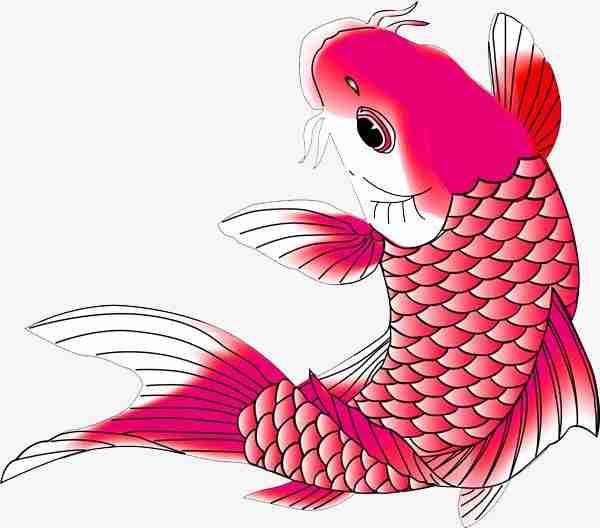
Fish is believed to symbolize abundance, unity, fidelity, and wealth. Beyond this, the Chinese consider fish to be a symbol of good luck in several ways. For starters, the Chinese pronounce fish in the same way as the word surplus is pronounced, which is in reference to the fact that fish is regarded as a symbol of abundance and wealth.
During the Chinese Spring Festival, for example, fish is often prepared than left uneaten. The reason why this is done is that the uneaten fish is meant to represent the human desire to always have something left over for the next year.
Fish is also seen in carp, which is also known as koi, as is depicted in most Asian Artwork.
There is also the angle of longevity, which comes from the fact that fish is able to grow really old, which means that fish is a great representation of longevity. At the same time, fish is also a representation or a symbol of fidelity and unity, which comes from the fact that fish often swim in pairs. This is also the reason why the fish charms used in jewelry are often in pairs, and they are offered as a wedding gift because the fish pairs represent the perfect union.
The last symbolism associated with fish has to do with fertility. Thanks to the fish’s ability to reproduce quickly and also in large volumes, fish is said to be a powerful symbol of fertility.
According to Feng Shui’s beliefs and traditions, fish, specifically the Goldfish or the koi fish, are believed to represent prosperity and wealth. The reason for this is that the actual word for fish is Pinyin, and it means abundance.
Fish has a significant symbolic meaning in Chinese culture. For example, the carp jumping over the dragon gate symbolizes success, and fish symbolize letters and happiness. During Chinese New Year, people must eat fish, which means having a surplus every year. Like geese, fish can also represent letters. In ancient times, people used silk to write letters and stored them in the belly of fish to secretly convey messages, called “fish carrying letters.” In the Tang and Song dynasties, nobles and officials carried gold-made letter symbols called “fish symbols” to show their status.
Fish sounds like “surplus” in Chinese, so it symbolizes wealth and prosperity. “Like a fish in water” describes a harmonious, happy, and comfortable life and work. The symbolism of fish is mostly positive, and keeping some fish at home can bring blessings to the family.
The shape, pattern, scales, and tail of fish are widely used in traditional Chinese jewelry. They are not only vivid and interesting, but also full of love for life, and represent good luck, wealth, happy marriage, love, bright future, and good luck.
Fish have strong reproductive ability, which fits the traditional Chinese expectation of having many children and a prosperous family. Fish cannot live without water, which is also a symbol of emotional expression, representing deep love between men and women, happy marriage, and a beautiful future.
According to legend, there was a myth in the Han Dynasty that carp could jump over the dragon gate and turn into a dragon, ascending to the sky. This symbolizes people’s desire for a better life and a bright future, becoming a symbol of good luck and success.
- Because “fish” sounds like “surplus” and “wealth” in Chinese, it has the auspicious meaning of “having surplus every year” and “abundance of gold and jade.” During holidays and birthdays, Chinese people often cook fish, not only for satisfying their appetite, but also to seek auspicious blessings.
- In ancient times, scholars often used fish and geese as messengers to deliver letters, and thus letters were called fish letters, carp silk, goose letters, etc. This is the origin of the story of “fish and geese carrying letters,” and when sending letters, people often shaped them into double carp for delivery, hence the saying of “sending plum blossoms by post, and carrying letters with fish.”
- During the Sui and Tang dynasties, there was a story about “carp jumping over the dragon gate.” The fish that jumped over the gate turned into a dragon, while the ones that failed remained ordinary fish. Later, “carp jumping over the dragon gate” came to symbolize success in passing examinations and promotion. It now often refers to going against the current and making progress, and can be translated into English as “leaping over the dragon gate.”
The fish head carries various symbolic meanings
Firstly, the fish head represents respect. In traditional Chinese culture, “fish” sounds similar to the word “surplus” or “abundance.” Therefore, consuming the fish head symbolizes the wish for abundance and fulfillment in all aspects of life. Additionally, during banquets, it is customary to present the fish head to esteemed elders or guests as a gesture of respect and reverence.
Secondly, the fish head symbolizes wealth. In the past, fish heads were considered a rare delicacy, accessible only to the affluent. As a result, the fish head is associated with prosperity, and consuming it is believed to bring good fortune and financial abundance.
Lastly, the fish head represents family unity and harmony. In Chinese culture, the fish head is often considered an essential dish on family dining tables, signifying the unity and happiness of the family. Whether during the Lunar New Year feast or guest visits, the presence of a fish head dish is vital for fostering closeness among family members and encouraging communication and bonding.
In summary, consuming the fish head not only signifies its deliciousness but also represents the desire for auspiciousness and good luck in its symbolic meanings.
Here are some phrases related to the symbolism of fish heads:
When the fish head is raised, good fortune often follows. With the presence of the fish head, a stroke of good luck is imminent.
Drinking the wine from the fish head brings you all the desires and aspirations for tomorrow. Wealth and success await your journey, and happiness will be complete.
With the fish head facing upwards, blessings are on this side.
From the heavens above to the earth below, the fish brings forth good fortune.
When the fish head tilts, wealth and auspiciousness arrive. With the fish head in the dish, indulge in fine wine three times.
From the fish head to the fish tail, everything flows smoothly. It is perfect and connected from start to finish. Cheers with the clinking of fish heads and tails, and piles of good things shall come. With a flick of the fish tail, the entire table smiles.
Fishtail meaning and symbolism
The fish tail has significant symbolism and meaning. The pronunciation of “fish” is similar to the Chinese word for “abundance” or “surplus,” symbolizing prosperity and abundance. It also represents a person with great talent and potential, symbolizing the hidden talents and capabilities of a person, often associated with the saying “hiding one’s abilities like a dragon or tiger.” This is why fish tail pendants are commonly seen without the fish head or body. Additionally, displaying fish tail ornaments in the home is believed to ward off negative energy and safeguard peace and safety.
The fish tail also symbolizes great talent. The carp’s ability to leap over the dragon gate represents a bright future, promotion to a higher position, and great success. Fish are often associated with lotus flowers and peonies, which symbolize wealth and auspiciousness. By isolating the fish tail, its symbolic meaning becomes more apparent.
It symbolizes prosperity and abundance. The shape, patterns, scales, and tail of a fish are frequently incorporated into traditional Chinese jewelry, conveying a sense of joy and love for life. It symbolizes good fortune, wealth, marital harmony, romantic happiness, a promising future, and luck.
It safeguards peace and safety. Placing fish tail ornaments in areas of negative energy in the home can help dispel negative energy and ward off evil. However, it is important to note that the most effective ornaments for countering negative energy are preferably in red color, as it is believed to be more conducive to dispelling negative energy.
Chinese Taboos Regarding Eating Fish
Fish head should face east, and fish belly should face north. In Chinese households, it is common for houses to be oriented north to south. According to customary etiquette, guests should sit on the “upper” side of the table (east side), while the host should sit on the south side as a gesture of hospitality. To show respect to guests, the fish should be served in a way that allows them to comfortably enjoy the meat. As fish is considered a special dish symbolizing abundance and prosperity, the fish head is positioned facing east as a blessing for the guests and as a sign of basic respect. When dining at home, the fish head should be directed towards the elders.
The first chopstick determines fortune, and the second chopstick opens up paths. Chopsticks play a significant role in Chinese dining etiquette. The host must not touch the fish until the guests do. In important occasions where merchants invite officials, the host uses the first chopstick to pick the meat from the fish cheek and offer it to the most esteemed guest at the table. The meat from the fish cheek is considered the most delicious. The fish head represents nobility, and the meat from the fish cheek is highly regarded. This act symbolizes the guest’s rise to higher positions. The host then uses the second chopstick to pick the fish meat for themselves, signifying prosperous business ventures. The fish tail, which is less desirable, is left for accompanying staff or individuals with lower status at the table. If there are no officials present, the portion intended for them can be offered to the leader.
The fish head should not be eaten. In formal banquets, the fish head should not be consumed, even by the most esteemed guest. Leaving the fish head implies “surplus year after year” (excluding specifically prepared fish head dishes).
The fish should not be flipped over. If the fish on top is finished while the one underneath remains untouched, it is advised not to flip the fish over. Instead, the meat from the lower side can be directly taken with chopsticks. Flipping the fish over is believed to bring bad luck.
Certain parts of the fish should not be touched. The fish eyes should not be touched or consumed, as the fish head represents the esteemed guest. It would be inappropriate to eat their eyes. Therefore, it is essential to remember that the fish head, including the eyes, should never be eaten.
are fish lucky in China
Yes, fish are considered lucky in China. In Chinese culture, fish symbolize good luck, prosperity, and abundance. The word for fish in Chinese, “鱼” (yú), sounds similar to the word for “surplus” or “abundance” in Chinese, which is “余” (yú). Because of this homophone, fish are often associated with abundance and prosperity.
Fish are also a popular food in China, especially during important occasions like the Chinese New Year. It is believed that eating fish during the New Year celebrations will bring good luck and prosperity for the coming year.
In addition to being considered lucky, fish also have symbolic significance in Chinese culture. The carp, for example, is often depicted in artwork and is associated with perseverance and determination, as it is able to swim upstream against strong currents.
What Is Lucky Fish For Chinese?
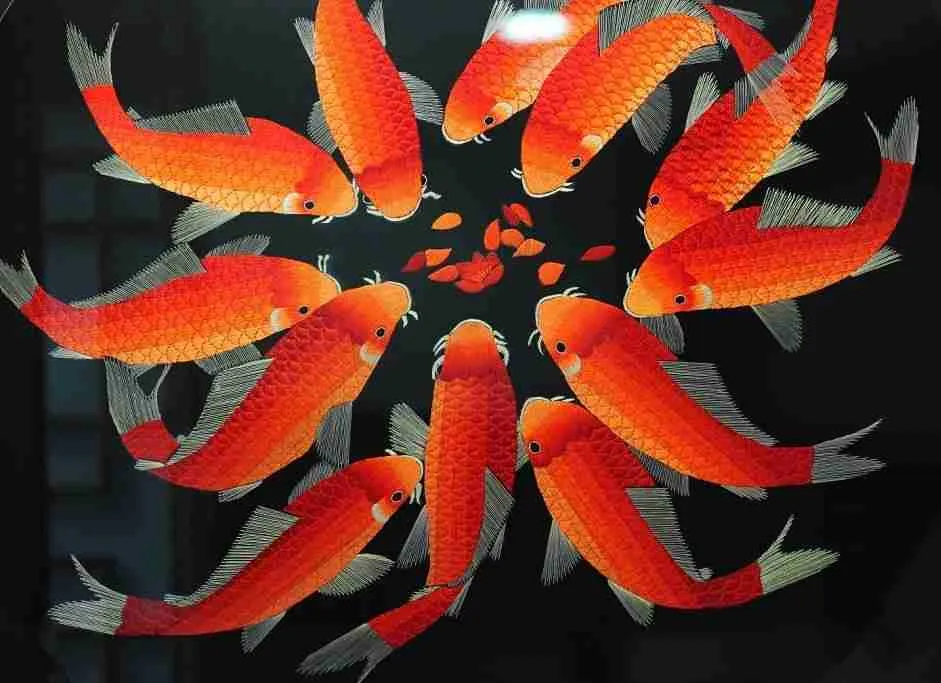
The Chinese consider the goldfish their lucky fish. But it’s not just the goldfish that is associated with luck.
One of the most auspicious fish varieties that is associated with luck in Chinese culture is the Dragonfish, also known as the Arowana. This fish is said to be a powerful fish that has the power to bring to you luck, good fortune, and prosperity. The reason for this is that some Chinese descendants believe in the mythical dragon, and as you may know by now, the dragon is held in high regard in Chinese culture. The gold and red color in the Arowana variety of goldfish is highly prized, especially because these colors are traditionally associated with good luck and good fortune.
It’s also the reason why the arowanas make up between 60 and 70% of the total sales by Qian Hu, who sells ornamental fish in China’s major markets.
There is also the high-grade silver Arowana fish that measures between 15 and 18cm. These are highly valuable fish categories that also bring good luck, which is why this rare variety of fish fetches several tens of thousands of dollars. This type of fish can live for about 25 years, reaching a length of 1meter. The rarity and longevity of this variety of fish is the reason why the Chinese consider fish a symbol of longevity.
Stingrays are also highly regarded in China, with people believing that stingray brings good fortune. They believe that the stingray is effective in attracting customers.
The Kao fish, in either red or black, is also a symbol of success and wealth.
Why Are Fish Lucky In China?
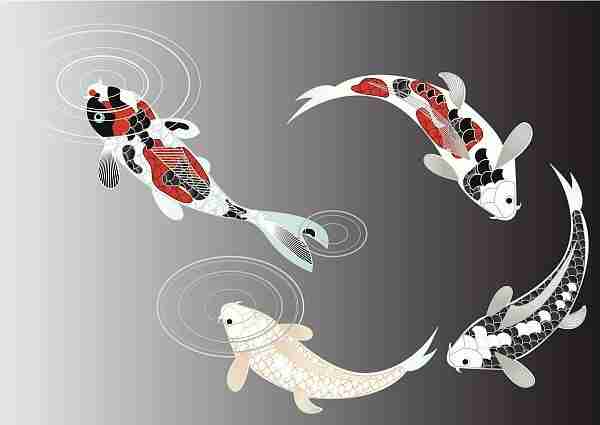
Like most Chinese symbols, carps have a legend attached to them. This legend notes that the carp is a brave and strong fish as it swims upwards against the current where it masters falls and eventually ends up at the gate on the Yellow River referred to as the Dragon Gate. The carp then turns up into the Celestial Dragon, which is a revered river as the carp makes its last leap over the last of the rapids. With this school of thought over the fish, the carps were kept in ponds by the Tang Dynasty.
Thanks to genetic mutations, some of the carps in the ponds would have a gold color and not the silver they were known for, and the gold variety of the carps was believed to be the most effective version of the fish, one to bring success and good fortune to the people who owned it.
And between 960 and 1279AD, when the Song Dynasty ruled China, the Empress of the empire, in 1162, ordered the construction of fish ponds that would house the red and gold carp. Interestingly, no one outside the imperial family was allowed to keep the carps or the red or gold goldfishes, especially because the yellow color is considered the imperial color. These rules led to a large number of orange goldfish and fewer red, yellow goldfishes. It wasn’t until 1276 AD when the first fancy-tailed goldfish was actually recorded. This took place during the time of the Ming Dynasty, which ruled China between 1368 and 1644AD.
With the associations between the dragonfish and the carps, along with the fact that the fish bear many inherent qualities that demonstrate their strength and persistence, it makes sense that these fishes are held in high regard and considered to bring a great deal of good luck, prosperity, and great fortune.
So, if you are wondering what the luckiest fish is for the Chinese, the answer is the dragonfish. It is also referred to as the Feng Shui fish, which is a great symbol for the display of dominance, power, and abundance.
fish in Chinese new year
Eating fish during Chinese New Year is a traditional custom in China that symbolizes abundance, prosperity, and good luck. The Chinese word for fish, “鱼” (yú), sounds like the word for surplus or abundance, “余” (yú). Therefore, eating fish during the New Year’s celebration is believed to bring good luck and prosperity in the coming year. Additionally, the way the fish is served, with the head and tail still attached, represents a good beginning and ending for the year. Overall, fish is a significant part of the Chinese New Year feast and is considered an auspicious dish.
why eat fish in chinese new year
Eating fish during the Chinese New Year symbolizes the wish for abundance and prosperity, as the word for “fish” in Chinese sounds similar to the word for “surplus”. In addition to its symbolic meaning, fish were also believed to have the power to ward off evil spirits. In ancient times, fish painted on doors played an important role in driving away demons.
During the Tang Dynasty, fish patterns could be found on door handles, doors, cabinets, and boxes to ward off evil spirits. This idea of using fish designs on door handles had a significant influence on the Chinese tradition of eating fish during the New Year. The belief in warding off evil spirits has gradually faded away, but the superstition of not eating the last piece of fish in order to have surplus every year still exists.
Fish is usually served as the last dish during a banquet, and it is customary to leave some fish uneaten to signify the hope for a good start and a good ending to the coming year. This tradition has been around for a long time, and eating fish during the Chinese New Year remains a popular custom in many regions.
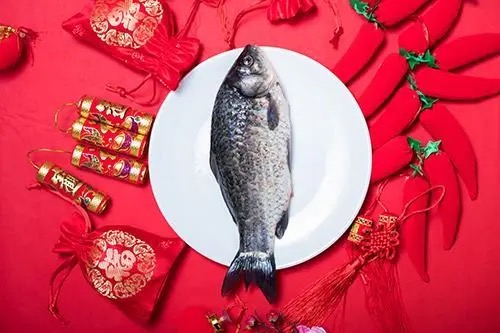
Traditions of Eating Fish during Chinese New Year
During Chinese New Year, it is customary to eat fish and to leave the head and tail until the following year to signify a good start and finish. The placement of the fish also has significance: the head should face the honored guest or elder to show respect, while the belly should face a guest who is a scholar to praise their intelligence and writing ability, and the spine should face a guest who is a military figure to praise their strength and courage. Once the fish is placed on the table, it should not be moved. The person sitting across from the fish head should “cut the ribbon,” and the person across from the fish tail should “sponsor.” After the two individuals clink their glasses and take a sip of wine, the person across from the fish head should take the first bite of the fish (known as “cutting the ribbon”), and then everyone else can begin to eat, creating a lively and joyous atmosphere.
What fish to eat during Chinese New Year
Carp
During festivals, the dining table is never complete without carp, which symbolizes abundance and success. The word “carp” sounds like “gift” in Chinese, and eating carp during Chinese New Year is considered lucky. Carp is rich in high-quality protein and amino acids, minerals, and vitamins A and D, which are easily absorbed by the body.
Crucian carp
Eating crucian carp during Chinese New Year is considered lucky because the word “crucian carp” sounds like “auspicious” in Chinese. Crucian carp is a great food supplement during the spring season, and regular consumption can help regulate blood pressure and blood lipid levels, as well as promote longevity.
Silver carp
Eating silver carp during Chinese New Year is believed to bring good luck and fortune because the word “silver carp” sounds like “year after year” in Chinese. Silver carp is sweet and slightly warm in nature, and is believed to strengthen the spleen and stomach, warm the body, nourish the hair, and promote lactation.
Grass carp
Eating grass carp during Chinese New Year symbolizes wealth and abundance. Grass carp is a popular freshwater fish with tender, juicy meat and few bones. It is often considered the best choice for springtime cuisine, as it has a delicate flavor and texture.
Precautions for eating fish during the Spring Festival
Eat less or avoid fish heads.
In 2013, the Nanjing Center for Disease Control and Prevention found that the older the fish, the more mercury accumulated in its brain and skin. For safety reasons, it is best to eat less fish head.
“Three Highs” individuals should avoid eating fish roe.
Fish roe is rich in phospholipids and has a high cholesterol content. “Three Highs” individuals are better off eating less. In addition, it should be noted that because there is a layer of film on the outside of the fish roe, it often “passes through the intestine,” and the nutrients are not easily digested and absorbed.
Try to eat a variety of fish.
Eels, saury and other fish with high fat content are suitable for grilling and can be squeezed with lemon juice when eating. Carp, white carp, grass carp, catfish and other fish taste better when braised. Yellow eel, black fish, carp, cod and other fish are delicious and are suitable for stewing. High-end fish such as sturgeon, sea bream, and perch have a delicate texture and are suitable for steaming to preserve their original flavor. Tuna, sea bream, salmon and other saltwater fish can be eaten raw, but fresh and safe consumption must be ensured.
fish symbol in China
The fish-shaped symbol is a traditional visual style in China, containing rich ethnic emotions and cultural connotations. The production of fish bags originated in the Tang Dynasty, prevailed from the mid-Tang to the Song Dynasty, and gradually declined after the Song Dynasty, completely disappearing in the Ming Dynasty. The fish bag is a bag used to hold the personal fish symbol, which officials could only carry after being rewarded by the court. The fish symbol is small and exceptionally precious, and can easily wear and lose if directly worn. Putting it in a fish bag can effectively preserve it.
The earliest fish bags were made of silk and satin. When officials used them, they first placed the copper symbol in a wooden box wrapped in black leather, and then placed the wooden box in a square black leather bag decorated with precious gold, silver, jade, and other materials, which was hung from the waist.
This unique and durable fish bag not only protects the fish symbol, but is also visually pleasing, and has been used until the Song Dynasty. From the artifacts and materials unearthed today, Tang Dynasty fish bags are divided into three types: early and middle period bags with decorated and undecorated flat surfaces, and late period bags with continuous convex surfaces. The bag surface decorations include peach-shaped and circular decorations. The decorations on the early and middle period Tang Dynasty fish bags are generally simple, while those on the late Tang Dynasty fish bags are more gorgeous and complicated, with obvious visual attraction, which better reflects the aesthetic value and social status of the fish bag.
During the reign of Tang Gaozong, the scope of fish bag wearing was small, and only officials above the fifth rank were given fish bags, which had to be returned upon retirement or resignation. During the reign of Tang Zhongzong, the old system was restored, and the turtle-wearing system during the Wu Zetian period was changed back to the fish-wearing system, and fish bags began to prevail again. The scope of wearing gradually expanded, and became a part of the Tang Dynasty’s official dress system. During the reign of Tang Ruizong, there were clear clothing regulations: officials above the third rank wore purple and carried a gold fish bag, while officials above the fifth rank wore scarlet and carried a silver fish bag.
The practice of wearing fish badges in ancient China was an important component of the country’s political system during the Tang Dynasty. During this time, the emperor awarded fish badges through the bestowal or lending of clothing, allowing lower-ranked officials to also wear them. Over time, the practice evolved into a lifelong privilege for officials, who were not required to return their badges after retirement. As the scope of awards expanded, the importance of fish badges as symbols of honor and favor within the bureaucratic elite grew, but with looser award standards, they became increasingly widespread.
In conclusion, the practice of wearing fish badges was an important part of China’s ancient political system and existed for hundreds of years. The fish-shaped symbol was valued by Tang Dynasty emperors and was incorporated into the country’s political system. The fish culture began to enter the courts, and the bestowal of favor and honor through fish badges brought about a butterfly effect in fish culture, with a broad and lasting impact. It was not only an effective means for the ruling class to manage the country, but also a cornerstone of the ancient ritual system that constructed social order and stable operation through the differentiation of status. Moreover, it represented the institutional recognition of fish symbol design by the ruling class.
The Tang Dynasty fish symbol was widely applied in clothing, architecture, and other areas. The fish-shaped design on these decorative objects not only served practical functions, but also met people’s spiritual and emotional needs, embodying a design philosophy of creating objects for the benefit of humanity and nurturing people’s emotions. The emotional materialization of object design gradually integrated into the lives of Tang people, and the culture was quietly embedded into the splendor of the Tang Dynasty. This promoted the overall progress and development of society, and the culture of design led to a widespread atmosphere that benefitted society and the masses. For modern design, there are many issues to study, such as how to combine design with practicality, how to reflect cultural tension, and how to integrate into life. Many answers can be found in the Tang Dynasty fish symbol design, providing inspiration and guidance.
Chinese two fish symbol meaning/double fish symbol meaning
Year after year surplus, reaching new heights, happiness in love, and good luck every year. Fish sounds like “surplus” in Chinese, so people use fish-shaped patterns to symbolize “year after year surplus”, “auspicious surplus”, and so on. It is said that carp can turn into a dragon and ascend to the sky after leaping over the Dragon Gate, which represents people’s desire for a qualitative leap in life and a beautiful wish to reach new heights. The Pisces pendant symbolizes auspiciousness, prosperity, happy marriage, romantic happiness, a bright future, and good luck. The Pisces pendant is the best praise for new couples, wishing them a happy marriage and a prosperous life.
Year after year surplus:
Fish sounds like “surplus” in Chinese, so people use fish-shaped patterns to symbolize “year after year surplus”, “auspicious surplus”, and so on. In fish-shaped patterns, carp and goldfish have richer contents and forms because “carp” sounds like “profit surplus” and “goldfish” sounds like “golden surplus”, and they are highly favored. Taking their homophony, we have the “profitable carp” and “surplus year after year” patterns.
Reaching new heights:
Legend has it that in the Han Dynasty, there was a myth about carp leaping over the Dragon Gate. It is said that carp can turn into a dragon and ascend to the sky after leaping over the Dragon Gate. This represents people’s desire for a qualitative leap in life and a beautiful wish to reach new heights. It has become a symbol of a bright future and good luck.
Happiness in love:
The shape, texture, scales, and tail of fish are widely used in traditional Chinese jewelry. Not only are they vivid and interesting, but they also exude a love for life and symbolize auspiciousness, prosperity, happy marriage, romantic happiness, a bright future, and good luck.
A happy marriage:
The Pisces pendant symbolizes a happy marriage, which is the best praise for new couples. It wishes them a heaven-sent marriage and the affirmation and blessings of all. It wishes that the new couple is the best match and will have a prosperous and happy life together.
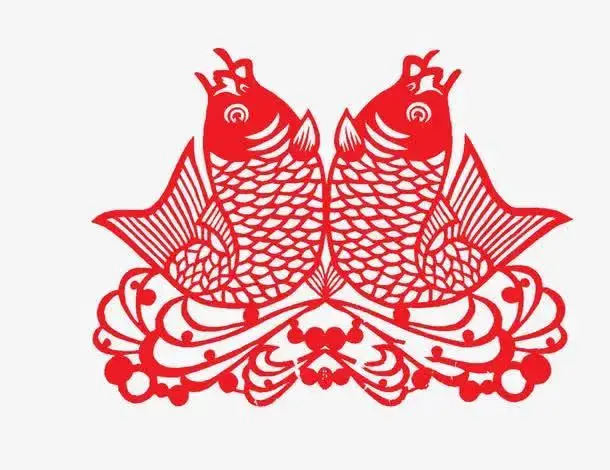
Chinese boy holding fish
The meaning of the “Baby Holding a Carp” painting is good luck, prosperity, and success in all endeavors every year. It represents a traditional Chinese New Year painting symbolizing auspiciousness and celebration. The painting depicts a chubby, adorable child holding a large red carp, which is considered a lucky fish that brings abundance and prosperity year after year. The baby symbolizes having many children, and the carp symbolizes having a surplus of resources. Some believe that children are like carp that can jump over the Dragon Gate and achieve success.
The meaning of this New Year painting is “having fish every year,” which is a homophone for “having surplus every year.” It is one of the most representative traditional Chinese auspicious symbols. If the painting also includes lotus flowers or lotus roots, it should be called “lotus and fish together,” which represents a prosperous life with surplus wealth and food every year. New Year paintings are used to create a festive atmosphere during the New Year and to pray for happiness and the elimination of disasters and misfortunes. Therefore, many families like to hang this “having surplus every year” painting.
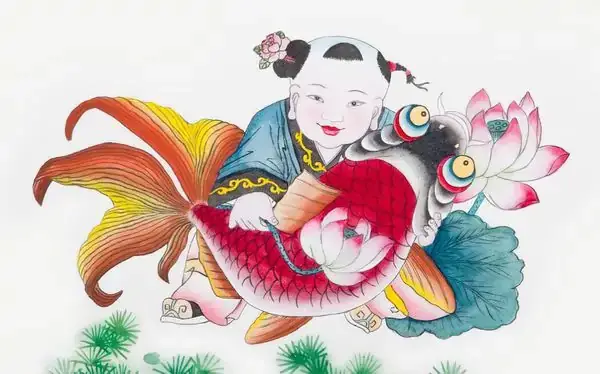
fish in Chinese wedding
Eating fish at a wedding banquet is a symbol of happiness and good fortune. When eating fish during a wedding, it is customary to leave the head and tail intact and only eat the middle section, representing the wish for the newlyweds to have a long and happy marriage with a good start and a good finish. In ancient times, there were also rules about the order in which the fish should be eaten. Starting from the head and eating towards the tail symbolized a smooth and successful life, as well as prosperity and happiness.
Here are two examples of fish and their symbolic meanings in Chinese culture:
Grass Carp – Symbol of Compatibility
The grass carp is a cute little fish that loves to eat aquatic plants and swims around freely. It represents freedom and friendship, and its taste is very similar to that of humans. The yellow grass carp is a popular dish at traditional Chinese weddings, as it is believed to symbolize a happy and successful marriage. It also represents the compatibility between the couple, and the hope that they will be happy together for the rest of their lives. In addition, the name of the grass carp sounds similar to the phrase “superfluous,” which is associated with the wish that the couple will have no unnecessary conflicts and disputes in their marriage.
In Chinese culture, there is a saying that goes, “The grass carp has a divided mouth, and when they look at each other, they cry. This represents the separation between husband and wife.” This emphasizes the importance of mutual understanding and appreciation in a marriage.
Common Carp – Symbol of Family Harmony
As one of the top ten traditional Chinese fish, the common carp is believed to symbolize good luck, wealth, and happiness. Its strong appearance, good quality, and adaptability make it a symbol of marital happiness, family harmony, and peace and unity in businesses, organizations, and countries.
During traditional festivals, the common carp is given special symbolic meaning as a representation of marital harmony and family unity. It is often hung on red lanterns or flags, which signifies the hope and sincere wish for a better future.
However, there is an old saying that “two carp cannot be together, or else one will reduce the other.” Too much harmony can lead to an imbalance in a relationship, so it is important to find a balance between compatibility and individuality in a marriage.
Happiness and Longevity – Crucian Carp
Crucian carp, also known as Chinese silver carp, is a symbol of wealth and prosperity in traditional Chinese culture, and is considered an auspicious food that brings longevity and good fortune. In the book “Fish Names” by Li Shizhen in the Ming Dynasty, it was recorded that “the flesh of the crucian carp is delicious and fatty in summer, and it is good for one’s health and vitality. Scholars often eat it to enhance their physical strength and prolong their lives. The fish is usually raised in ponds with abundant water supply during the summer, and stored in mud ponds during the winter for future consumption.”
In marriage, crucian carp represents long life for the couple, happiness for the family, and prosperity for their offspring. In Northeast China, it is a tradition to prepare a dish called “three-color silver soup” during holidays, which includes crucian carp, pigeon meat, and green onions. Crucian carp symbolizes happiness and wealth, and is believed to bring joy, prosperity, and good fortune to the family.
Different types of fish have different symbolic meanings, and the cultural significance of fish often evokes thoughts of marriage and family. It is hoped that people can not only appreciate the delicious taste of food, but also experience the cultural emotions that food brings.
fish in chinese mythology/fish myths and legends
Aoyu
Aoyu is an animal in ancient Chinese mythology. According to legend, in ancient times, gold and silver carp wanted to jump over the Dragon Gate and ascend to the clouds to become dragons. However, they secretly swallowed a dragon pearl from the sea, so they could only transform into fish with dragon heads and bodies, known as Aoyu. Male Aoyu have golden scales and a gourd-shaped tail, while females have silver scales and a hibiscus-shaped tail. They frolic and swim in the sea all day long. In the novel “Investiture of the Gods”, it is written that Wu Yunxian shook his head and transformed into a golden-bearded Aoyu, and then he was caught by a boy who rode on the Aoyu’s back and went to enjoy the blessings in the Eight Virtues Pool in the west. This passage reads: “Playing and frolicking in the Eight Virtues Pool, accompanied by a golden lotus, enjoying leisure and freedom.”
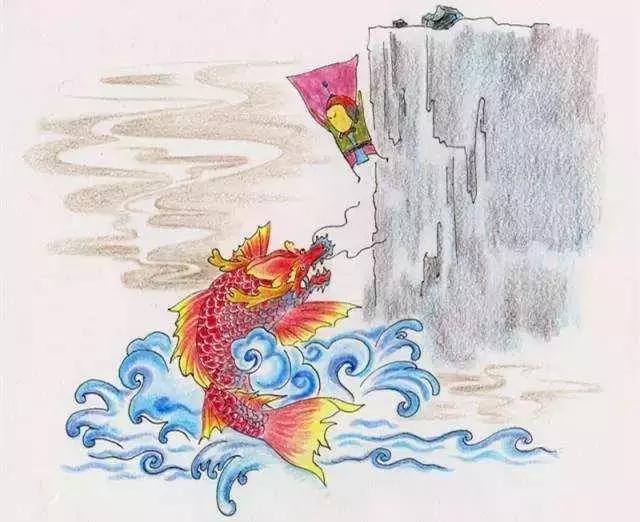
Mermaids
In the “Classic of Mountains and Seas: Northern Part of the Third Classic”, it is written: “Two hundred miles northeast is Mount Longhou, which has no grass or trees, but is rich in gold and jade. The clear water flows from there and merges into the river to the east. Many mermaids live there. They look like fish with four legs, their voices are like infants, and eating them will not cause any foolishness or sickness.” In the “Taiping Guangji”, there is also a record of mermaids: “There are mermaids in the East China Sea, which are as long as five or six feet. They look like beautiful women with eyebrows, eyes, nose, mouth, hands and claws. Their skin is white as jade, without scales, with fine hair, and light and soft in five colors. Their hair is like a horse’s tail and is five or six feet long. Their genitals are no different from those of men and women, and they are not harmful to humans when they mate.”

Chiwen
According to “Qingxiang Zaji” written by Wu Chu Yuan in the Northern Song Dynasty: “Haiwei fish has a scaly tail like a Chi bird’s beak, which can spray waves and cause rain.” Installing two Chiwen on the roof ridge can prevent fires. Chiwen is the ninth son of the dragon and likes to swallow things. Its appearance is that of an animal head on the ridge of a building. It is often used as a decoration for buildings, especially as a beast head that guards against fire on the ridge of a house. It is made to look like a mouth that is swallowing the ridge, and is fixed with a sword. From the evolution of ancient totem worship, the transformation of fish into dragons occurred because ancient clans that worshiped fish totems merged with the national dragon totem. The totemic image used as a emblem also changed accordingly, becoming a fish-dragon with a dragon head and a fish body.
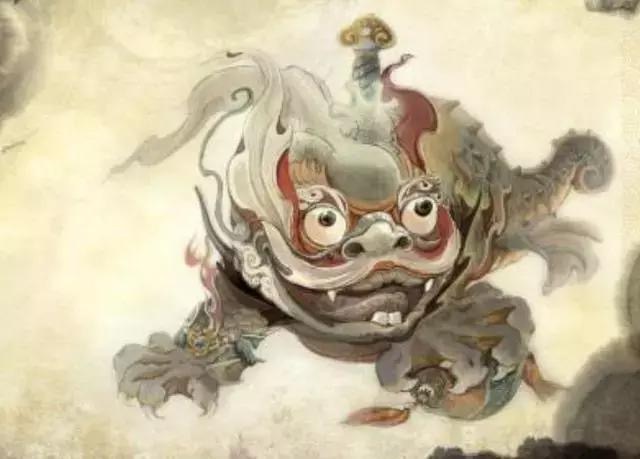
Kunpeng and Whale
Kunpeng feeds on the pure air of the nine heavens, according to the book of Zhuangzi. Some believe that Kun is the same as whale in Zhuangzi. The book “Wuzazu” states that Kunpeng is several thousand miles long, which may be a fable from Zhuangzi, but in “Gujin Zhu” by Cui Bao, it is said that “whales can grow up to a thousand miles in length,” which suggests that it may have actually existed. “Shen Yi Jing” says, “The great fish of the Eastern Sea can be seen in a day when traveling towards its head, and in seven days when traveling towards its tail.” In my hometown by the sea, we often see strange fish. One day, a giant fish as big as a mountain, several hundred feet long, rode the tide into the harbor and couldn’t return when the tide went out. The villagers used giant trees to prop up its mouth and cut its flesh, which amounted to more than a hundred stones. The Kunpeng family is most famous for its role in ancient fantasy novels as a demon master, creating demon texts, teaching millions of demons, and standing at the pinnacle of the heavens, overlooking the world. It was second only to the Demon Emperor, truly below one demon but above millions of demons.

Black-scaled Mermaid
The U.S. Navy once caught a live one. It is said that the oil of the mermaid in the sea not only has a low burning point, but also can burn for months with just a drop. In ancient times, the oil was often used to make eternal lamps in the tombs of nobles. The mermaids of the East Sea are the most lascivious, with a taste for blood. They gather under a dead coral island in the sea, where the coral caves are intertwined and deep, and no one knows their true depths. That is the mermaid’s lair, where they emit sounds and colors to attract passing ships and merchants. All the victims were eaten to the bone, leaving nothing behind. Some people have caught live black-scaled mermaids, slaughtered and dried them, poured their oil into them, and made eternal candles worth three thousand gold and pearls.

Henggong Fish
Henggong Fish is a legendary monster fish in ancient Chinese mythology that is born in a stone lake that never freezes. It is seven or eight feet long, red and shaped like a carp. It stays in the water during the day and turns into a human at night. Its skin is impenetrable by thorns, and it does not die when boiled. However, if it is boiled with two black plums, it will die, and eating it can cure evil diseases. At night, the Henggong Fish jumps onto the shore, sheds its thick shell, and looks somewhat like a human. This is where the saying “transforming into a human at night” comes from.

Who is the Chinese god with the fish?
- Nan Kun Shen Li Wangye is the Fish God. Wufu Qiansui is a traditional folk religious belief in the Minnan-Taiwan region. Due to its geographical location, Wufu Qiansui is honored as the “Nan Kun Shen Wang” (South Kun Shen King). The Nan Kun Shen Temple in the Beimen Township of Tainan was built in the first year of the Kangxi era (1662 AD) and is also known as the “Nan Kun Shen Temple.” It is the first temple dedicated to Wufu Qiansui in Taiwan and is also referred to as the “Mountain Opening Temple.” The followers of Nan Kun Shen mainly reside in the coastal areas, where fishing was the main industry. Therefore, residents believe that Nan Kun Shen can bless them with safe voyages.
- The Fish God, also known as the Sifu Bodhisattva or the Fish Master, was originally named Chen Wumao and came from a poor fishing family. He was skilled in understanding water conditions, tides, and weather, and could see the fish and shrimp in the sea. He was later killed by wicked people but appeared in the dreams of fishermen, who followed his instructions to remove his eyes and affix them to the bow of their boats, which they painted white. This was said to attract schools of fish to their nets. The fishermen then built a temple and a statue in his honor, depicting him as a fisherman in a purple-bronze face, wearing a bamboo hat, dragon pants, holding a yellow fish in his left hand, a fish fork in his right hand, and standing on a large fish.
Chinese dragon fish mythology
The legend of “Carp Leaping Over the Dragon Gate,” also known as “Fish Leaping Over the Dragon Gate,” is a popular Chinese folk tale that takes place in the region of the Longmen Grottoes in Luoyang, Henan province. It is said that due to the turbid water of the Yellow River, only the hardy carp can survive, and their scales are golden because they grow in yellow muddy water. Every spring, these golden carp swim upstream and gather at the foot of the Longmen waterfall, where the water is too fast for any fish to pass. It is believed that if a carp successfully jumps over the Longmen, it will turn into a dragon and ascend to the heavens. “Fish Leaping Over the Dragon Gate” is used to describe the spirit of hard work, perseverance, daring to dream, and daring to act. After the imperial examination system was established, “Fish Leaping Over the Dragon Gate” was used to describe the success in the imperial examinations. Therefore, the Longmen has a sacred status in Chinese culture.
why is fish important in China
Fish is an important part of Chinese cuisine and culture. In traditional Chinese culture, fish is considered a symbol of good luck, abundance, and prosperity. The Chinese word for fish (鱼, yú) sounds like the word for abundance (余, yú), which has contributed to its symbolic meaning.
In addition to its cultural significance, fish is also an important source of protein and nutrients for the Chinese population, particularly those living near rivers, lakes, and oceans. The Chinese have been consuming fish for thousands of years and have developed a rich and diverse culinary tradition centered around various fish species and preparation methods.
Furthermore, fish plays an important role in Chinese religious and folk beliefs. There are various fish-related legends and stories in Chinese mythology and folklore, such as the legend of the Dragon Gate, which symbolizes the idea of perseverance and success. Overall, fish is deeply rooted in Chinese culture and continues to play an important role in the daily lives and traditions of many Chinese people.
koi fish meaning
Koi fish are ornamental fish that have deep cultural significance in many Asian countries, particularly in Japan. In Japanese culture, koi fish are a symbol of perseverance, determination, and strength, as they are known for their ability to swim upstream against strong currents.
Koi fish are also associated with good fortune, success, and prosperity. In Japan, they are often kept in outdoor ponds and gardens, and are highly regarded for their beauty and grace. The colors and patterns of koi fish have different symbolic meanings, with the red and white koi (known as Kohaku) being considered the most auspicious.
In Chinese culture, koi fish are also associated with good fortune, as the Chinese word for fish (鱼) sounds similar to the word for abundance (余). Koi fish are often depicted in Chinese art and literature as a symbol of wealth, success, and perseverance.

dragon fish
The Arowana, also known as Dragon Fish, is a freshwater fish of the osteoglossidae family and the Osteoglossum genus. Its scientific name is Osteoglossum bicirrhosum, but it is also commonly called the Asian Arowana, Golden Arowana, or Yellow-Tailed Arowana. Originally from rivers and lakes in Malaysia and Indonesia, it has been introduced as an ornamental fish to various parts of the world. The Arowana is one of the oldest primitive fish species, and can grow up to 50-65 cm in length, with some individuals reaching over 100 cm. They have a lifespan of several decades.
The Arowana has a cylindrical, slightly flattened body, and its skull is made up of detached bony plates. It has a large mouth, which is either superior or terminal, and the upper jaw is made up of the premaxilla and maxilla bones. The lip corner has two barbels, and the belly has ridges. The pelvic fins are in a ventral position, the pectoral fins are low, and there are no adipose fins. The dorsal fin is small or medium, and the anal fin is located at the back of the body or connected to the caudal fin. The body is covered with round scales, and it has a lateral line. The trunk is covered with large and orderly arranged shining scales.
The Arowana is an extremely valuable ornamental fish, originally from Southeast Asia, including Vietnam, Thailand, Cambodia, Myanmar, Indonesia, and Malaysia. It is most commonly found in Kalimantan, Sumatra, and the Malaysian Peninsula and Sarawak. It has been introduced as an ornamental fish to various parts of the world.
The Arowana is a tropical stenothermal fish that prefers water temperatures between 24-29℃. It often lives in the upper layers of water, and requires high water quality. It is a carnivorous fish with strong attack and territorial instincts, feeding mainly on aquatic insects, crustaceans, small fish, frogs, and terrestrial insects that fall into the water. In captivity, it can be fed small fish, shrimp, poultry and livestock meat, bloodworms, and mealworms.
Chinese goldfish
Chinese goldfish, also known as the “golden fish” or “jinyu” in Chinese, is a species of freshwater fish that is widely bred and kept as a popular ornamental fish in China and around the world. It is a member of the carp family and has been selectively bred over centuries to achieve various shapes, colors, and patterns, including the iconic round body and flowing fins. In Chinese culture, goldfish symbolizes good luck, prosperity, and abundance, and it is often displayed in homes and offices as a feng shui element.
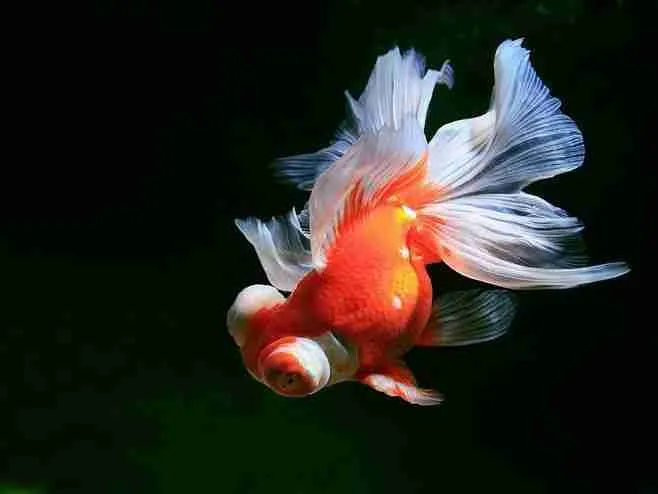
fish in feng shui
Fish in Chinese sounds like the word “surplus” or “extra”, therefore many families consider fish to be a symbol of good luck and prosperity. Some families even like to keep fish as pets to improve their Feng Shui. In addition to keeping live Feng Shui fish, Chinese-style home decor fish are also popular among Chinese households. However, it is important to note that these Feng Shui fish decorations are more suitable for traditional Chinese interior design, and may not fit well with Western-style decor. Moreover, there are certain principles that must be followed when selecting and placing these Feng Shui fish decorations to ensure their effectiveness.
The auspicious meaning of fish in Feng Shui
Fish can drive away negative energy
It is important to note that like other Feng Shui decorations, the placement of Chinese-style home decor fish in different locations will have different effects. By placing Feng Shui fish decorations in areas with negative energy, such as areas with sharp corners or conflicting elements, it can help to ward off negative energy and promote positive energy. It is recommended to choose red-colored fish decorations for this purpose, as this color is believed to be more effective in warding off negative energy and promoting good luck.
Fish should be in pairs
It is important to note that like many other Feng Shui decorations, fish decorations also require the use of even numbers. This is especially true for fish, which symbolize good luck and prosperity. Therefore, it is recommended to purchase fish decorations in pairs and place them accordingly.
The Feng Shui meaning of the Prosperity Fish
The Prosperity Fish, also known as the Arowana fish, is a fish with a distinctive oval-shaped head and a large mouth. It is golden in color and is considered to be a symbol of good luck and prosperity. The Prosperity Fish is originally from South America, but is now widely distributed in Southeast Asia and other countries and regions. Due to its golden color and its name, which sounds similar to “wealth” in Chinese, it is believed that this fish can bring wealth and prosperity to its owner. Moreover, due to its gentle temperament and fast growth rate, it is also relatively easy to raise and maintain as a Feng Shui fish decoration.
Meaning and Symbolism of Feng Shui Fish:
Dragon Fish:
Dragon fish are often raised in industries with large capital flows, as high flows can bring heavy negative energy. People with strong desires and aggressive behaviors often enter and exit such industries. Keeping a tank of dragon fish can prevent evil spirits and ghosts from acting recklessly, making them useful for warding off evil and negative energy. However, it is essential to choose the right location.
Koi Fish:
Koi fish are a popular feng shui fish that can ward off disasters and block negative energy, promoting health, career, and wealth development. Many banks and places with large accumulations of wealth raise koi fish.
Blood Parrot Fish:
Blood parrot fish are a type of yin-yang fish, similar to lions, tigers, and mules, that cannot reproduce. However, their red color is particularly pleasing to the eye and symbolizes wealth in feng shui, making them a popular feng shui fish that people often discuss.
fish in Yin and Yang
In traditional Chinese culture, Yin and Yang represent the two complementary and interdependent principles of the universe. Yin represents darkness, femininity, and negativity, while Yang represents light, masculinity, and positivity.
There are some types of fish that are considered to have Yin and Yang properties, which make them popular in feng shui practice. For example, the Blood Parrot Cichlid (血鹦鹉) is considered a Yin and Yang fish because of its red color, which symbolizes wealth and prosperity. Similarly, the Arowana (龙鱼) is also considered a Yin and Yang fish due to its majestic appearance and reputation as a bringer of good luck and wealth.
In the original meaning of the Book of Changes, the symbolism of fish is based on the hexagrams and lines of the Book of Changes. One is to take the prominent features of the Yin lines, and the other is to take the “Xun Gua” (the Wind Gua) of the eight trigrams. Fish, as a Yin object, lurks in the water, representing concealment and changeability, which is like the wind. The Xun Gua is also Yin and represents wind, so fish in the Book of Changes generally represent the Xun Gua.
In ancient times, the sun and birds were closely linked, and birds were seen as spiritual creatures that could sense the sun’s “Yang Qi”. Different birds would mate and chirp at different times of the solar calendar, and migratory birds would move with the changing seasons. Therefore, birds became a tool for testing and verifying “Yang” Qi, and even flowers like hyacinths were shaped like birds. The character for “Yang” in its earliest form included the sun and bird shapes. In ancient times, the “Bird Calendar” was used to observe the birds’ habits to determine the seasons of the solar calendar. The “Yellow Bird Division” refers to the swallow’s migratory pattern, which marks the arrival of spring and the departure of autumn.
The character for “Yin” in its earliest form included the shape for “Qi” on the left and the shape for “moon” (or fish) on the right. Therefore, the “fish” was seen as a spiritual creature that could sense the moon’s “Yin Qi”. Female fish lay eggs during the new and full moon phases, and their reproductive characteristics are related to the lunar cycle. Therefore, “fish” represents “Yin”, and the character for “Yin” includes either the shape of the moon or fish. The relationship between fish and the moon is discussed in the book “The Tao of Yuan Zhen” in the chapter “Fish, Moon, and Rebirth”.
Yin Yang fish
Yin Yang fish is a Tai Chi symbol consisting of two fish, one black and one white, in a circle. It is not a random doodle, but a symbol with profound cultural significance that emerged from the integration of various ancient Chinese cultures.
In early Tai Chi diagrams, there was no Yin Yang fish in the center of the Eight Trigrams. It was not until the Song Dynasty that Cai Yuanding, a disciple of the Neo-Confucian master Zhu Xi, saw the Yin Yang fish pattern during his travels in Sichuan and inserted it into the center of the Tai Chi diagram, forming the Tai Chi symbol that we commonly see today, also known as the natural diagram of heaven and earth. This Tai Chi symbol is in line with the philosophy of the Book of Changes: “The way is to alternate between yin and yang” and “The Book of Changes has Tai Chi, which gives birth to two instruments, the two instruments give birth to four images, the four images give birth to eight trigrams, and the eight trigrams determine good and bad luck, which gives birth to great enterprises.”
The Tai Chi symbol is a circular pattern composed of two fish-shaped patterns in black and white, commonly known as the Yin Yang fish. Tai Chi is an ancient Chinese philosophical term meaning the origin of all things. The Tai Chi symbol expresses the philosophy that yin and yang alternate and complement each other, which is the root of all things’ generation and change.
The Yin Yang fish refers to the central part of the Tai Chi diagram, which is known as “the first diagram of China.” This widely known Tai Chi symbol is shaped like two fish intertwining with each other in yin and yang, thus commonly referred to as the “Yin Yang fish Tai Chi symbol.”
The Yin Yang fish is widely used, appearing in the beams and columns of the Confucian Temple’s Dacheng Hall, the Tower Observation Platform, the Three Miao Palace, and the Baiyun Guan’s marks, the Taoist priest’s robes, the fortune-teller’s divination stand, traditional Chinese medicine, qigong, martial arts, book covers on Chinese traditional culture, emblems, logos, the South Korean flag, the South Korean Air Force emblem, the Mongolian flag, the Mongolian military emblem, the Angola Air Force emblem, the Singapore Air Force emblem, and the Nobel Prize Medal, among others.
Conclusion:
- The ideological origin of the “Yin Yang Fish” Tai Chi diagram can be traced back to the primitive concept of yin and yang, but the specific form of the diagram cannot be directly derived from the symbols and signs of primitive times.
- The “Yin Yang Fish” Tai Chi diagram is related to Taoism, and the viewpoints of Hu Wei in the Song, Yuan, and Qing dynasties are generally credible, with a focus on concepts such as inner alchemy and yin yang. The “Water and Fire Rectification Diagram” and the “Three-Five Ultimate Diagram” cannot be directly derived from the “Yin Yang Fish” Tai Chi diagram.
- The claim that Chen Tuan or Xue Feng, hermits from Sichuan, or hermits from Qingcheng Mountain created or initiated the “Yin Yang Fish” Tai Chi diagram is uncertain due to the lack of evidence. It cannot be easily denied or affirmed.
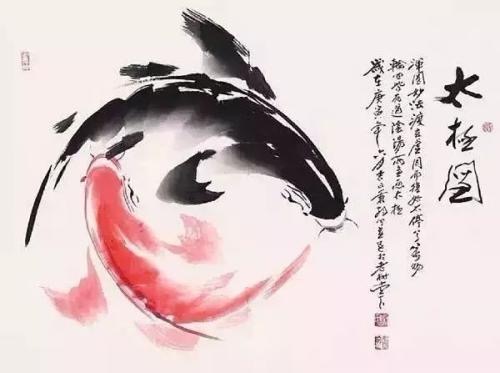
fish in the five elements
Fish have been traditionally associated with the Five Elements theory in Chinese culture. The Five Elements, also known as Wu Xing, are Wood, Fire, Earth, Metal, and Water. Each element is associated with a specific season, color, direction, organ, and emotion.
Fish are considered a symbol of abundance and prosperity in Chinese culture, and they are often included in traditional Chinese New Year celebrations as a symbol of good luck and fortune. In the Five Elements theory, fish are primarily associated with the Water element.
According to this theory, Water nurtures Wood, which means that fish are also associated with growth and abundance. Fish are believed to bring good luck and fortune, and their image is often used in traditional Chinese art and decor.
Fish also have cultural and spiritual significance in other cultures around the world, such as the Christian symbol of the fish and the Japanese koi fish, which represents perseverance and determination.
fish in Taoism
As early as the Shang and Zhou dynasties, the Chinese began to eat carp. Due to its beautiful color, large size and delicious taste, carp became a precious gift and a popular dish in Chen State during the Spring and Autumn Period. The Book of Songs, in the “Heng Gate” section of the Chen Songs, mentions the love of Chen people for carp and their preference for the Yellow River carp. Even Confucius received a gift of carp from Lu Zhaogong to celebrate the birth of his son, giving rise to the story of “Kong Li.”
The connection between carp and Taoism dates back to the Han Dynasty, with the story of immortal beings riding on carp to ascend to the heavens in Liu Xiang’s “Biographies of Immortals.” Afterwards, carp became associated with Taoism and a symbol of enlightenment. Even the famous Taoist scholar Ge Hong in the Eastern Jin Dynasty referred to carp in his “Baopuzi” as a sign of attaining the Tao.
Literary scholars in later generations held carp in high esteem and associated it with the legend of the transformation of carp into dragons, leading to a deep faith in carp among Taoist believers. Therefore, it is forbidden to eat carp in Taoism. In addition, the Tang Dynasty rulers claimed to be descendants of Laozi, the founder of Taoism, and since “Li,” the surname of Laozi, sounds similar to “li,” the Chinese character for carp, they regarded carp as auspicious. The Tang Dynasty issued an edict banning the capture of carp and requiring the release of any caught carp. Market vendors selling carp were also punished. The Tang government even produced fish-shaped badges to distinguish officials of different ranks, reflecting the high status of carp at that time.
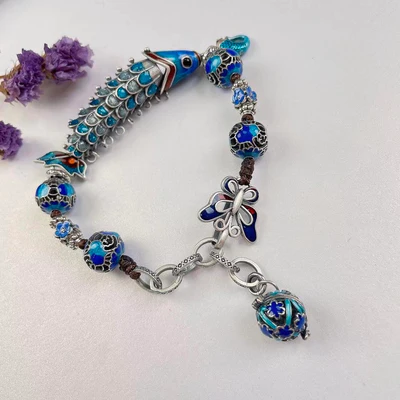
fish in Confucianism
Fish also have a significant presence in Confucianism, one of the major philosophical and ethical systems in China. Confucianism emphasizes the importance of filial piety, respect for elders, and the maintenance of social order, among other values.
In the Analects of Confucius, one of the most important texts of Confucianism, there are several mentions of fish. For example, in Book 5, Chapter 13, Confucius says, “A noble person loves men, a small person loves goods. A noble person takes justice seriously, a small person takes fish traps seriously.” This passage suggests that a noble person values justice and human relationships over material possessions, while a small person is focused on catching fish.
In addition, Confucius is said to have used the fish as a metaphor for his teachings. The phrase “to fish with a straight hook” (jian yu yi kou) is often used to describe the Confucian approach to education and self-cultivation. This phrase means that instead of using bait or trickery to catch fish, one should use a straight hook, which represents the straightforward and honest approach to learning and self-improvement.
In life, we often face many choices and it depends on how we choose. Mencius was good at using metaphors. He said that if a person has to choose between a fish and a bear’s paw, he should “give up the fish for the bear’s paw.” This is the common practice of people – to choose the better option and abandon the worse. Based on this, Mencius discusses the relationship between life and morality. Although life is very important, Mencius believes that morality is more important than life. Therefore, he advocates the idea of “abandoning life for the sake of morality”. Throughout history, he has inspired countless people to sacrifice their lives for the interests of their country, nation, and people. Mencius also talks about life and death from the perspective of human desire. If what a person desires is more than life, nothing is more important than life. If what a person hates is worse than death, nothing is worse than death. In such a situation, the opposite may happen. Mencius deduces from the sense of shame that what a person loves and hates is more important than victory or death. However, the difference between the wise and the unwise is that the wise can put morality above life without losing their sense of shame. Morality is more important than life and wealth, which satirizes those who value profit over morality in society!
Overall, fish in Confucianism symbolize different values and virtues, such as the importance of honesty, justice, and social order.
fish in Buddhism
Fish is one of the auspicious symbols in Buddhism. It represents the infinite vitality of Buddha’s teachings, freely swimming in water, effortlessly overcoming obstacles, and achieving liberation from suffering.
The Eight Auspicious Symbols, also known as the Eight Treasures of Buddhism, symbolize the power of Buddhism with eight visualizations of the senses of sight, sound, smell, taste, touch, thought, and consciousness. They are depicted in various forms of art and are often displayed in Buddhist temples. The eight symbols are the wheel, conch shell, umbrella, canopy, lotus flower, vase, fish, and endless knot.
Goldfish symbolize freedom, transcendence, wealth, and harmony. They move freely in water, see through the turbid mud, and have “wisdom eyes.” In Buddhism, a pair of male and female goldfish symbolize the state of liberation and also represent rebirth and eternal life. The eyes of a goldfish represent the eyes of the Buddha, always watching over sentient beings and never abandoning them.
In the mundane world, goldfish symbolize our ability to see things for what they truly are and possess exceptional wisdom, which enables us to attain wealth and freedom effortlessly.
Fish and Buddhism have a close relationship, as seen in the wooden fish used as a ritual instrument in Buddhism, which is shaped like a fish. In ancient times, the wooden fish was mainly used as a signal to gather the monks. The wooden fish used in temples can generally be divided into two types: circular and rectangular. Circular wooden fish come in various sizes, while rectangular wooden fish are mostly around one meter long. As a Buddhist ritual object, the origin of the wooden fish has various legends. One legend tells of King Kalabu of Jambudvipa, who had committed many sins in his lifetime and was reborn as a thousand-headed fish in the ocean. He was constantly being decapitated by a sword and reborn, trapped in the cycle of reincarnation. He asked an Arhat to strike a wooden board regularly to reduce his karmic obstacles. Another legend tells the story of “Fish-Belly Boy” in Buddhist scriptures. It tells of a Brahmin family in India, where a child named Baojuluo was mistreated by his stepmother after his mother died when he was very young. One day, when his father was away, his stepmother threw him into the river, and he was swallowed by a large fish. The fish was caught by a fisherman and sold in the market. Baojuluo’s father happened to buy the fish and was preparing to cook it when Baojuluo shouted from inside the fish’s belly, “Father, be careful not to harm your son.” His father quickly cut open the fish’s belly and saved him. It is said that Baojuluo later went through various hardships and became a disciple of Shakyamuni Buddha, living to be 160 years old, becoming the longest-lived disciple of Buddha. Another story that is passed down in Buddhism tells of how during the Eastern Han Dynasty, the emperor sent Master Ciguang and two monks to the Western Regions to obtain sutras. After experiencing many hardships, they obtained the sutras and were on their way back when a fierce storm hit, and a ferocious fish attacked their ship, swallowing the sutras in one bite. The two monks jumped into the sea and fought the fish, finally killing it and bringing its head back to the temple. To recover the sutras, they struck the fish’s head and recited “Amitabha Buddha” every day. The fish head was eventually pounded into powder, and a wooden fish was made in its likeness and struck every day while reciting sutras. This is how striking the wooden fish while reciting sutras became a Buddhist tradition.
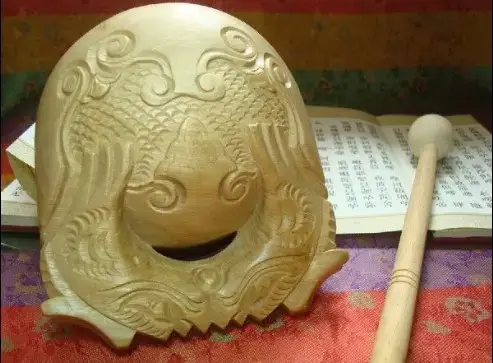
two fish symbol Buddhism
This is one of the Eight Auspicious Symbols in Buddhism: the pair of fish. It represents the two eyes. Fish can swim freely in water, symbolizing the practitioner who transcends the world, is free and unrestrained, and attains liberation through practice. In Tibetan culture, a pair of male and female goldfish are usually used to symbolize the state of liberation, that is, the freedom to attain liberation.
fish in Chinese medicine
Fish has been used in Traditional Chinese Medicine (TCM) for thousands of years. Different types of fish are believed to have different therapeutic properties, and they are often used in combination with other medicinal ingredients to treat various health conditions.
Some common types of fish used in TCM include:
Carp (鲤鱼): Carp is believed to nourish the blood and regulate qi (vital energy). It is often used to treat anemia, fatigue, and menstrual disorders.
Eel (鳗鱼): Eel is believed to nourish the blood and tonify the kidneys. It is often used to treat lower back pain, weakness in the legs, and impotence.
Tuna (金枪鱼): Tuna is believed to reduce inflammation and detoxify the body. It is often used to treat skin conditions, such as acne and eczema.
Silver carp (银鱼): Silver carp is believed to nourish the yin (cooling, moistening aspect of the body) and benefit the lungs. It is often used to treat coughs, asthma, and dry skin.
Black carp (青鱼): Black carp is believed to nourish the blood and benefit the liver. It is often used to treat dizziness, blurry vision, and liver disorders.
In TCM, fish can be prepared in various ways, such as steaming, boiling, and stir-frying. They can also be combined with other medicinal ingredients to make soups, stews, and teas. However, it is important to note that some fish may contain high levels of mercury and other toxins, which can be harmful to health. It is recommended to consume fish in moderation and to choose types that are known to be low in toxins.
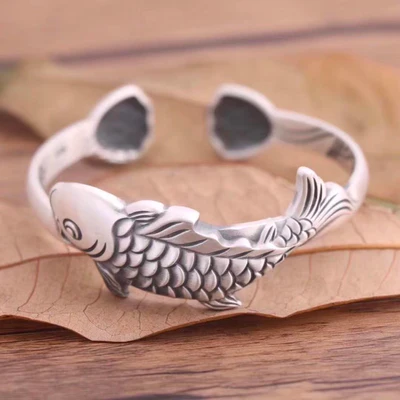
fish and sheep
The Chinese character “鲜” combines the characters for fish and sheep, representing fresh and delicious food. The earliest appearance of the character “鲜” can be traced back to the Western Zhou dynasty’s bronze inscriptions. The character’s original form combines the shape of a fish and a sheep, both of which are known for their delicious taste. Therefore, it represents the meaning of fresh and tasty.
fish about in Chinese story
jiang taigong fishing
The story of Jiang Taigong fishing is a legendary tale that occurred during the Shang and Zhou Dynasties. King Zhou of Shang was a cruel ruler, and King Wen of Zhou was determined to overthrow his tyranny. Jiang Taigong, under his master’s orders, descended to the mortal realm to help King Wen. However, Jiang Taigong was doubtful that, being in his fifties and having no connection with King Wen, he would ever gain the king’s appreciation. Therefore, on King Wen’s way back to his capital, Jiang Taigong fished on the riverbank using a straight hook without any bait. Although the hook was curved, Jiang Taigong used it straight, and he did not use any bait. King Wen saw this and was amazed, recognizing Jiang Taigong as an exceptional talent, and recruited him into his service. Later, Jiang Taigong assisted King Wen and his son in overthrowing King Zhou of Shang, establishing the Zhou Dynasty. There is a popular saying about this story: “Jiang Taigong fishing – the willing ones take the bait.”
During the Spring and Autumn period, Gongzi Guang of Wu was determined to overthrow King Liao of Wu and ascend to the throne himself. Exploiting King Liao’s love of fish and the fact that Wu’s main army was trapped in the state of Chu, Gongzi Guang invited King Liao to his home for a banquet, where he had an assassin hidden in the basement and a dagger concealed in a fish’s belly. Gongzi Guang’s subordinate, Zhuo Zhu, successfully assassinated King Liao, but was killed by the guards. Gongzi Guang ascended the throne and became King Helu of Wu.
fish belly collection
During the Qin Dynasty, Chen Sheng and Wu Guang were escorting laborers to Daze Township (now Yongqiao District, Suzhou City, Anhui Province) when they were delayed by heavy rain and were sentenced to death according to Qin’s laws. Chen Sheng and Wu Guang decided to rebel to win the people’s support. They cleverly used superstition by writing “Chen Sheng King” on a piece of white cloth and secretly putting it into a fish’s belly. When the soldiers bought the fish and opened it, they were amazed to find the words on the cloth. At midnight, Wu Guang ran to a nearby dilapidated temple, lit a fire, pretended to be a fox, and shouted, “Great Chu will rise, Chen Sheng King!” The soldiers were frightened and amazed. After the rebellion started, people responded quickly, and the rebel army soon captured Daze Township. Nearby farmers brought food to support them, and young people came to join the army with hoes and shovels. Without weapons or flags, they made wooden sticks into weapons and bamboo into flagpoles. Thus, Chen Sheng and Wu Guang established the first peasant uprising in Chinese history. This story is from the Records of the Grand Historian written by the Han Dynasty historian Sima Qian.
fish vs dragon
Fish and dragon hold significant cultural meanings in China.
Fish, especially carp, is a symbol of abundance, good luck, and prosperity. In traditional Chinese culture, fish represents a desirable outcome, and it’s often served whole to represent unity and completeness. The pronunciation of the Chinese word for fish, “Yu,” is similar to the word for surplus, which reinforces the idea of abundance and prosperity. Fish are also associated with the Chinese New Year celebration and are often included in the traditional New Year’s Eve dinner.
On the other hand, the dragon is one of the most important symbols in Chinese culture, representing power, strength, and good luck. Dragons are often depicted in Chinese art, and the image of the dragon is used in Chinese architecture, clothing, and even tattoos. In Chinese mythology, dragons are said to control the weather and water, and they are associated with the Emperor, who is also known as the “dragon throne.”
In summary, while both fish and dragon hold positive cultural significance in China, fish is primarily associated with abundance and prosperity, while the dragon is seen as a symbol of power and good luck.
what do fish symbolize in a dream?
Dreaming of fish has always been closely related to wealth in traditional Chinese dream interpretation, because “fish” and “surplus” have the same pronunciation in Chinese.
- If you dream of fish swimming in clear water, it symbolizes that you will gain wealth and power, or that your current mood and situation are good. It may also indicate unexpected income or a promotion.
- If you dream of a group of fish swimming, it suggests that you will have good financial luck recently, and it may be worthwhile to invest in business, which may bring you some gains.
- If you dream of fish struggling in shallow water, it indicates that your work progress is difficult and you may be demoted.
- If a man dreams of catching fish, it indicates that he will face a great crisis.
- If a woman dreams of catching fish, it indicates that she will have a wealthy husband and a happy life.
- If you dream of live fish, it suggests that you may travel on the sea.
- If you dream of dead fish, it indicates disappointment and frustration. You may encounter setbacks, difficulties in your career, and struggles in life.
- If you dream of releasing dying fish back into the water and letting them revive, it implies that you hope to obtain a suitable position based on your own abilities and have aspirations for your career.
- If you dream of buying fish, it may indicate that you will inherit property from relatives or receive gifts.
- Dreaming of catching fish in the water indicates that you will rely on your own abilities and exceptional courage to achieve the wealth you desire.
- Dreaming of someone giving you fish predicts that you will receive wealth or may be invited to attend a wedding. If the fish given is dry, it suggests that you will have surplus in your life.
- Dreaming of fishing usually indicates that you can resist temptation. If you dream of fishing by the river, it may also indicate that your interpersonal relationships may encounter obstacles.
- Dreaming of fishing in clear water and seeing the fish biting suggests that you will get what you want and achieve your wish.
- Dreaming of catching big fish is auspicious and indicates that everything will go well. Women will marry into wealthy families, those seeking official positions will obtain them, and those seeking wealth will obtain it.
- Dreaming of catching goldfish suggests that you may experience an adventure, such as unexpectedly meeting an old friend on the street.
- Catching fish in a dream indicates that you will succeed, and the bigger the fish you catch, the greater your success will be.
- Dreaming of fish eating rice and wheat suggests that there may be floods or obstacles in agricultural activities.
- Dreaming of fish in well water suggests that you will become wealthy or gain unexpected income.
- Dreaming of eating fish suggests that your love life may be slightly subdued, but it also indicates that you are physically strong and will be happy and healthy.
- Women dreaming of fish swimming in water indicate that their actions will be restricted by their husband.
- Young women dreaming of fish suggest that they will have a handsome and talented husband.
- Dreaming of fish jumping from the water to the surface suggests that you have recently been in the limelight, and it is a good time to increase your visibility.
- Dreaming of snatching someone else’s fish or picking up fish is an unlucky omen that suggests your health will be in trouble. Therefore, you should pay attention to physical discomfort and seek timely treatment to avoid regrets.
- Dreaming of small fish giving birth is a good omen, and you may receive unexpected income.
- Dreaming of dead fish coming back to life suggests that you will rise from the dead. If you are seriously ill, you may be able to create a recovery miracle. Such a dream means that the dilemma will no longer exist.
Pingback: A pranzo da nonna…(cara…) – lamiacucinacinese